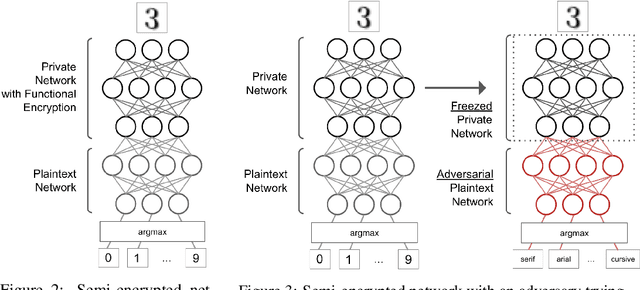Theo Ryffel
Partially Encrypted Machine Learning using Functional Encryption
May 29, 2019



Abstract:Machine learning on encrypted data has received a lot of attention thanks to recent breakthroughs in homomorphic encryption and secure multi-party computation. It allows outsourcing computation to untrusted servers without sacrificing privacy of sensitive data. We propose a practical framework to perform partially encrypted and privacy-preserving predictions which combines adversarial training and functional encryption. We first present a new functional encryption scheme to efficiently compute quadratic functions so that the data owner controls what can be computed but is not involved in the calculation: it provides a decryption key which allows one to learn a specific function evaluation of some encrypted data. We then show how to use it in machine learning to partially encrypt neural networks with quadratic activation functions at evaluation time, and we provide a thorough analysis of the information leaks based on indistinguishability of data items of the same label. Last, since most encryption schemes cannot deal with the last thresholding operation used for classification, we propose a training method to prevent selected sensitive features from leaking, which adversarially optimizes the network against an adversary trying to identify these features. This is interesting for several existing works using partially encrypted machine learning as it comes with little reduction on the model's accuracy and significantly improves data privacy.
A generic framework for privacy preserving deep learning
Nov 13, 2018

Abstract:We detail a new framework for privacy preserving deep learning and discuss its assets. The framework puts a premium on ownership and secure processing of data and introduces a valuable representation based on chains of commands and tensors. This abstraction allows one to implement complex privacy preserving constructs such as Federated Learning, Secure Multiparty Computation, and Differential Privacy while still exposing a familiar deep learning API to the end-user. We report early results on the Boston Housing and Pima Indian Diabetes datasets. While the privacy features apart from Differential Privacy do not impact the prediction accuracy, the current implementation of the framework introduces a significant overhead in performance, which will be addressed at a later stage of the development. We believe this work is an important milestone introducing the first reliable, general framework for privacy preserving deep learning.
 Add to Chrome
Add to Chrome Add to Firefox
Add to Firefox Add to Edge
Add to Edge